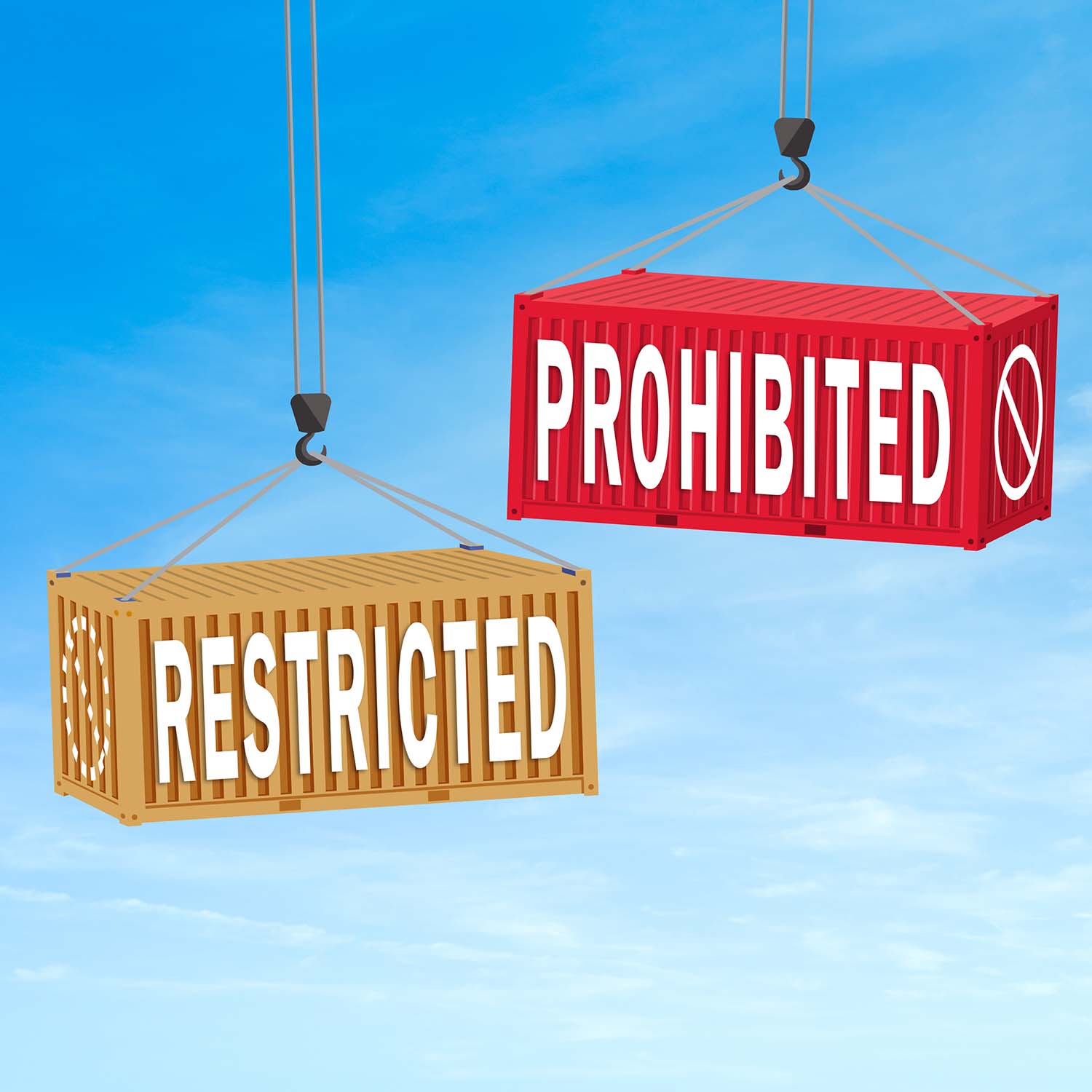Import: Restricted and Prohibited
Due to Brexit, the information contained in this article may not be accurate. As more information becomes available, this content will be updated.
Restrictions and Prohibitions
All countries restrict or prohibit the import and export of certain articles based upon:
- Concerns for health, safety, and public morality (e.g., foodstuffs, agricultural products, live animals, biologic materials, pharmaceuticals, illicit drugs, chemicals, hazardous products, and materials deemed indecent).
- Protection of the physical and economic security of the state (e.g., arms, armaments, dual-use technology, radio and television transmitters and receivers, radioactive materials, seditious materials, and currency).
- Economic protection or subsidization of domestic industry (e.g., non-tariff barriers to trade for imports and control of natural resources for exports).
- Enforcement of provisions of multi-lateral trade agreements (e.g., those designed to protect endangered and threatened species of animals and plants and those designed to protect copyright, patent, and trademark holders against infringement).
By Destination Country
In some cases, the degree of restriction depends on the destination country. This is true for dual-use goods, whether they are of civilian or military origin. Country-specific embargoes or moratoria may also be in effect and may be seasonal or of short duration.
By Quota
The import of certain goods is sometimes restricted by quotas, meaning the goods can be imported within the limits strictly set by the UK. An import license is required to import products subject to quotas. Examples of these products are industrial, agricultural, textile, and steel products.
Restricted
Examples of products restricted from import into the UK are:
- Agricultural products (partially governed by the EU's Common Agricultural Policy or CAP)
- All goods subject to phytosanitary controls (plants and vegetable products, including fresh fruit and vegetables) require a license from the Department for Environment, Food, and Rural Affairs
- Live animals, and foodstuffs and other products of animal origin (these articles must be presented for veterinary inspection at an EU-approved Border Inspection Post (BIP) and license and/or Common Veterinary Entry Document must be issued by the Department for Environment, Food, and Rural Affairs)
- Aquaculture animals and products (must also be presented for inspection at a BIP, and require a license and/or Common Veterinary Entry Document from the Department for Environment, Food, and Rural Affairs)
- Wood products (packaging, bark, chips, particles, sawdust, wood waste and scrap)
- Narcotic drugs and psychoactive substance, drug precursors, pharmaceutical products, and veterinary medicines
- Chemicals (regulated by Registration, Evaluation, Authorization and Restriction of Chemicals, or REACH, legislation), and ozone-depleting substances
- Pesticides and biocides
- Waste products
- Weapons, firearms and ammunition, explosives, and dual-use goods, and radioactive products
- Licenses for the import of nuclear materials are issued by the Civil Nuclear Security and Safeguards (CNSS) division of the Office for Nuclear Regulation (ONR); licenses to import chemical weapons are issued by the Chemicals Weapons Authority, a part of the Department for Business, Energy, and Industrial Strategy (BEIS)
- Tobacco products and alcohol
- All licensed goods
- Some iron and steel products
- Some species of fauna and flora threatened with extinction, regulated under CITES (the Convention on International Trade in Endangered Species of Wild Fauna and Flora), or products made from those plants or animals
- Diamonds and diamond powder must be processed and certified under the Kimberly Process Certification Scheme.
- Licenses are issued by BEIS for certain textiles, iron and steel products, firearms, ammunition, anti-personnel mines, torture equipment, and military equipment originating in or consigned from North Korea
Prohibited
Some articles are totally prohibited from import into the UK. Examples of these include:
- Counterfeit goods and offensive weapons
- Indecent or obscene publications, videos, and other articles
- Some or all products from Iran, North Korea, Myanmar, or Libya
- Fur skin of harp and hooded seals pups and products made from such fur
- Cat and dog fur and products made from such fur
- Finished goods of certain fur skins covered for personal and private use
Special Registration Requirements
AGRIM Certificates
Key elements of the European Union's Common Agricultural Policy (CAP) remain in place for the UK. It mandates that import licenses, referred to as AGRIM certificates, are required for food and wine products imported from non-EU countries into any country in the EU. A new CAP was formally adopted on December 2, 2021, and will begin being implemented on January 1, 2023.
The UK's Agriculture Act passed in November 2020 sets out a legislative framework for a new subsidy regime. The Department for Environment, Food and Rural Affairs published The Path to Sustainable Farming: An Agricultural Transition Plan 2021 to 2024, which sets out plans for a range of schemes, including initiatives to increase biodiversity, restore landscapes, promote animal welfare, and increase productivity through investment in new equipment and technology. Central to the new regime is the Environmental Land Management Scheme (ELMS).
Registration, Evaluation, Authorization and Restriction of Chemicals (REACH)
All importers of chemical substances covered by Convention on International Trade in Endangered Species of Wild Fauna and Flora (CITES) must be registered with the European Chemicals Agency (ECHA), if chemical substances imported into the UK are a ton per year or more.
Note: Import restrictions and prohibitions are subject to change. It is important to obtain the latest information from a customs broker, freight forwarder, or the local customs authorities.
Sources: Her Majesty’s Revenue and Customs or HMRC (www.gov.uk/government/organisations/hm-revenue-customs/services-information); Institute for Government (www.instituteforgovernment.org.uk)
Article written for World Trade Press by Brielle Burt, Jennifer Goheen, and Nina Bellucci.
Copyright © 1993—2024 World Trade Press. All rights reserved.

 United Kingdom
United Kingdom 